
Spend While You Can ««« 2016 »»»
08.05.16
-Colette
I went to collect the few personal belongings which... I held to be invaluable: my cat, my resolve to travel, and my solitude.
To Portland and St. George
Trips never seem to lend themselves to coherent narratives. The way I experience them is as a series of events between which I bounce until eventually landing at home, my bank account lighter, sand in all my clothes, wounded, with a few strange souvenirs, but satisfied in a way nothing else manages. While I am in the midst of travel, lingering on what has come before and what may come after is a sure way to forget the moment I am in. I exist in a part exhausted, part amused haze as weeks-worth of events are squeezed into twelve or so hours every day.
Since coherence is not the operative lens and because I do like taking photos, I shall opt for explanations of snapshots. If I've done my job, the juxtaposition will imply a narrative. If not, you sat through a stranger's vacation photos and are no worse off.
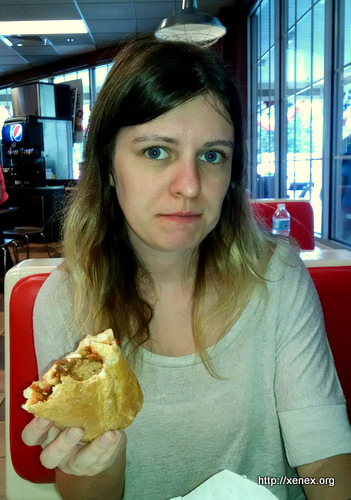
Driving up, singing along to whatever bad radio we can get. As far as I can tell, Maine has a musical fascination with bad country stations, preachers, and Bon Jovi. Once we pass the border of New Hampshire, we lose the ability to find alternative stations or rock music that was minted after 1979, and even then the DJ seem to have gotten their stock from the discount bin of a gas station.
Amber has no working CD player, but she had her air conditioning fixed so I would not complain during our trips this summer, which I consider a win. I would much rather tunelessly croon the fifth replay of Meghan Trainor than broil.
On one of those corridors of the highway that is nothing but rocks and trees, where the sky is a pale blue strip being fuzzed into patches by the reaching branches, we are delayed an hour in traffic. I read Amber the complete text of Terry Bisson's "Bears Discover Fire" as the radio picks up no station and it passes the time.
Before traffic eases back, we pass a car, overturned and crushed. Whoever had been in there, if they survived, has had a day far worse than an hour's postponement to a vacation.
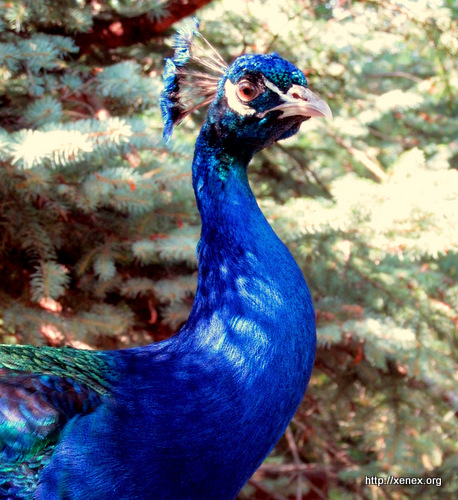
We stop at York's Wild Kingdom to break up the drive. This park is both a zoo and an amusement park, though the amusement portion is designed for small children who would be entertained by a traveling carnival, so we opt to skip it for the animals. Most of beasts are sleeping in the corners of their cages, but I cannot much blame them for ignoring us. Confronted with an existence composed of tourists kept at a distance by fences and wire, I think I would get in as many naps as possible.
Amber doesn't care about the slothfulness of the animals (especially the sloth) because she sees them with new eyes. She has been studying for her coming career as a student of veterinary science (she will get an Associate's to be a vet tech first, but she appends her likely interest in being a full-fledged veterinarian in six years' time) in the fall and sees them all as potential subjects for her knowledge. In her shoes, I would approach my classes with a sort of eager ignorance, daring my teachers to fill my stubborn head. She has read several of her textbooks in full, as well as associated material. This is to be expected, as she devours books on whatever subject has caught her momentary fancy.
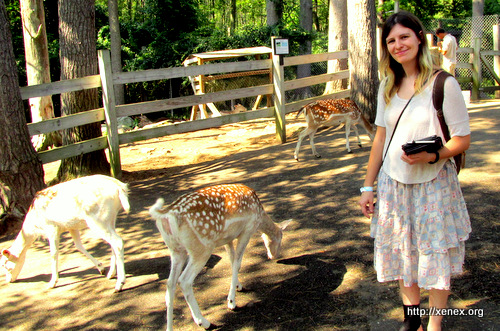
When we are caged in with some deer, they surround her as though she were a Disney princess, though they have just come to understand that the humans in their pen are likely to have tasty pellets. Once one devours every bit of food I got from the vending machine, the cervine word gets out that I am to be ignored.
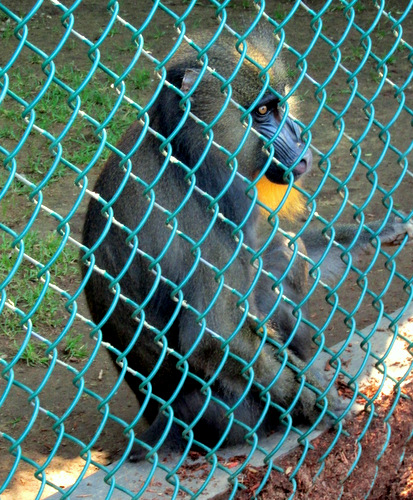
This monkey sat at the edge of its cage, making eye contact with anyone who gave it a moment's attention, chewing the coating from the cage.
Amber pitied it but could contrive no way to rescue it so it could accompany us on our journey. This is for the best, as it would be hard to justify to innkeepers.
Too hungry to continue our trip to the Inn at Portland yet, we follow signs for a restaurant we never find, instead turning into a plaza to the first eatery we do find. It is darkly-lit and intimate, with a flaming oven in the corner. The waitress seats me on a pillow strewn bench. Amber orders a seafood chowder likely too full of sea bugs to be anything but toxic to me.
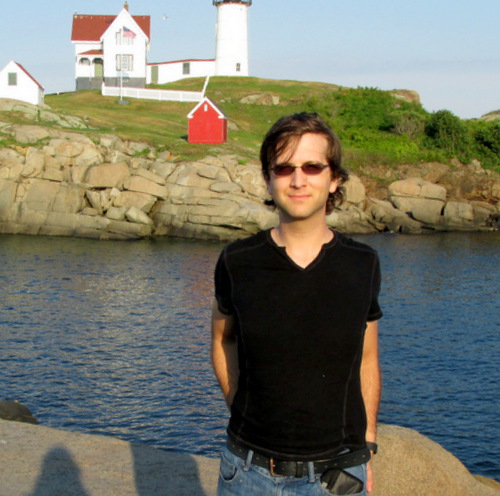
After satisfied with food, Amber sees a sign for a lighthouse when we were about to make our way to the hotel for tonight. "What do you think?" she asks as there is any real choice here. We are not on this trip not to take random courses as fate sets for us. When has a strict schedule on vacation ever been the point?
Ten minutes later, we stand on in a parking lot with two dozen other tourists, taking selfies with the lighthouse on a small island across a hundred feet of ocean. We follow suit because we are classless tourists and it is the surest way to remember the moments we spent here. I have decided that I choose to feel no shame about taking pictures because I will not deprive myself of pleasure to appease social propriety with a stick up its ass. They are my pictures and, if they will allow me to feel glimmers of what I did in these places, they are blessings.
When we arrive at the Inn at Portland, it is a rundown hotel behind an Asian bistro. I am certain I am being brutally overcharged given the lack of amenities, but there is nothing to be done about it now. This is part of the experience and I will have wanted to do this later. I am buying the memories I want to have, which is all the more reason to take cheesy pictures. We tried to find a bed and breakfast or a quirkier place to stay, but expecting rooms to be open in Portland when booking only a few weeks in advance is ridiculous. We got the best we could given our apparent lack of planning.
A man who will be played by Paul Giamatti in my biopic hands us our Domino Pizza branded keycards and wishes us a pleasant visit, but that he will charge us $250 if we even think of smoking on the premises. When we get into the hotel's hallway, I gather this penalty is not leveraged often enough.
On the side of the Asian bistro, men with hangdog expressions smoke as though sucking down their last cigarette before execution. For the duration of our stay here, there are always men here, sitting on overturned soy sauce buckets. We do not look long enough to determine if it is the same men or if it is simply that all men in the employ of this restaurant have such a fatal attachment to their cigarettes.
Perhaps it is the threat of a fine that has gotten them down.
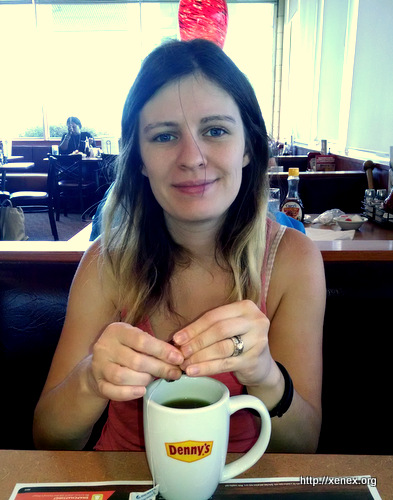
We walk the next morning to the nearby Denny's. The Hudson Valley used to have a couple, one of which was the setting for the Mid-Hudson Pagan Network meetings before its inevitable collapse, but they were shut down. I remember greatly enjoying the Grand Slam breakfast and would order it for every possible meal, but this was a time before I understood and certainly before I had the ability to quantify calories and fat. When I woke up before Amber, I skimmed through the Denny's website so I could know exactly how bad this meal would be for me.
I immediately figure out how I can approximate the experience of a Grand Slam without regretting it for the rest of the day, substituting in whole wheat pancakes and a chicken sausage to obviate the worst of it. The home fries are a non-negotiable, as I recall them being my favorite part of the meal.
Amber, who respects that unhealthy food is the whole point of vacation, orders the full-fat, full-calorie version of a Grand Slam. She offers me a corner of her pancake after she has taken a few bites. "What does that taste like to you?" she asks.
"Birthday cake. Like exactly," I assure her to her agreement. I do not feel I am missing as much, suddenly, and question the pallet of my childhood self.
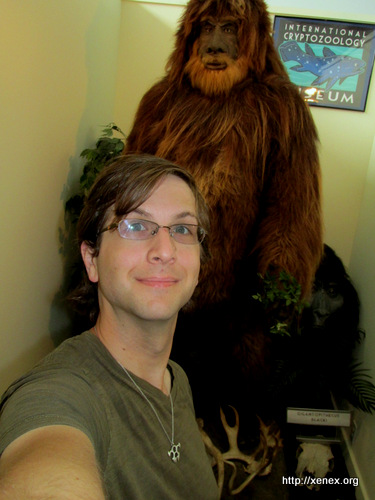
Our first stop of the day is the International Cryptozoology Museum, which was partly how Amber induced me to agree that Maine might be a good vacation destination for us. Bringing in Fortean phenomena is a sure way to get my interest, particularly with the idea that this might be an exclusive experience. The website promises that this museum is one of a kind, which could work against its favor in the public eye, since competition breeds excellence.
The website promises that esteemed cryptozoologist Loren Coleman will be at the museum today, signing books. I am thrilled, until I remember that Coleman runs the museum and his presence is not quite so rare as a jackalope.
When we arrive at the museum, we are stopped from entering so we can watch an orientation video starring Coleman, the point of which that the museum is a collection from Coleman's research, we may take pictures but not of everything, and that we shouldn't touch anything. Once the man at the counter is fairly sure we watched it, though not that we paid any attention, he accepts our admission.
It is two floors, comprised partly of faked sideshow exhibits like Jenny Hanivers, fur-bearing trout, and Feegee mermaids, some Bigfoot artifacts from Coleman's research or purchased from other researchers, and a small portion of caricatures of and articles about Coleman. The incurious visitor could have seen every exhibit within fifteen minutes and not feel they had missed anything from the experience. Even given my status as a fantasy author and poker of the paranormal, we don't last much more than half an hour. I know the myths and research the way more sensible people know their times tables. My greatest surprise is that his map of cryptids features a mention of Kipsy, the river monster claimed to infest the Hudson River around Poughkeepsie.
In their defense, their collection of Bigfoot accoutrements far outshines the spread at the California Bigfoot Museum.
We linger in the gift shop as Amber and I pick over what souvenir we want from this place, as it is obvious we have to buy something. The clerk tells me that Coleman is here today. I tell me I realized that, as I had passed by him some half dozen times. He tells me I should formally meet him, though he of course only knows that we are the only patrons of the museum today; he is unaware that I have any stake beyond my powerful social anxiety when confronted with the possibility of shaking the hand of anyone more famous than I am. Amber encourages me to say hello, at least.
I walk up to Coleman, shake his hand, and tell him I am a fantasy author from New York. I tell him a little of what I've written, primarily of Artificial Gods since that applies most directly to his own studies. I see in his eyes the moment I become nothing more than a UFO believer to him. I am unclear if Coleman sees ufology as having any overlap in cryptozoology. He equates what I write to HP Lovecraft and I fumblingly try to explain how I think I am different, though I don't know why expect that the justification has a momentum of its own and I cannot stop it from pouring out.
I buy one of his books for him to sign. He takes from his pocket my business card so that he can spell my name right. I do not ask him to include my last name. He inscribes that I ought to keep watching the skies.
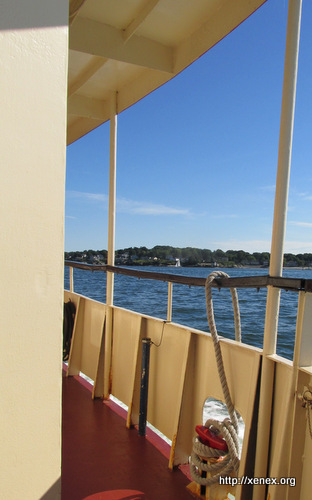
We wander through Portland proper. It is the first time since the lighthouse the day before that I have smelled the sea, though the lighthouse air was more a salt breeze. On the day we visit Portland, it smells like low tide.
After checking out the shops (and trying to catch Pokémon), we arrive back to the shore to buy tickets for a tour of lighthouses. Since I have seen molds of sasquatch feet, it is only fair that we do something Amber would enjoy. They are, of course, sold out for two hours.
Amber had spied that there is an art museum somewhere in Portland, so we trod through the streets with Amber's vague sureness that we are going in the right direction. I do not want to again miss the boat, so I am focused more on the hour than finding the museum.
When we do, we try to take in the culture almost through osmosis. There is no way we are getting the full experience of the art, though I flit between a few pieces that speak to me, informed by their explanatory plaques when I think I am proximal to genuine appreciation. In the best of circumstances, I am boorish enough to tell applauded artists that I best like pieces that look like things, so I am not to be trusted with my own edification. Amber doesn't begrudge me this, too intent on her own experience to bother with how closely I squint at the cracks in the painted thighs of a nude self-portrait.
I shoo her back onto the street when the appointed time elapses. We follow a different path to the boat, but I am comfortable with the digression because any path that goes downhill is sure to lead to the sea.
Once we are on the boat, surrounded by incisive old women, unable to comprehend the narration over the squeaking speakers, speeding between distant shores, Amber looks where our boat has cut a path through the water.
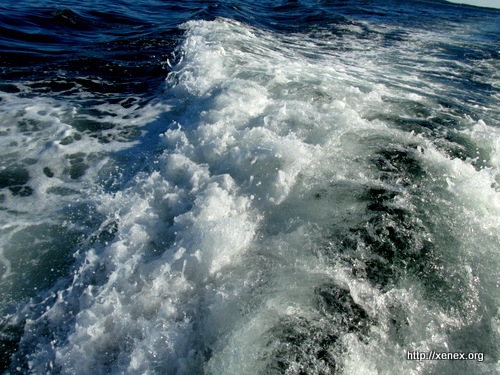
"Do you see the unicorns jumping?" she asks.
For the first time in my life, I think I can, their white heads barely cresting above the wake.
She points to where the horizon meets, the sky stopping and ocean beginning. I am a child of mountainous regions. It makes my head swim. Out there, one can get lost forever.
The next day, we head to Freeport. We had aspirational plans to spend the day at one of the beaches we spotted from our boat ride - I envisioned a picnic lunch and much splashing about in lapping tide - but looming rain made this plan unlikely.
What is in Freeport? Why, it is the home of the LL Bean factory. I have no special love for LL Bean clothing or wares, though Amber aches to wrap me in flannel that I might resemble the boyfriend of a fictional serial killer with a sophisticated palette.
Without going too deeply into the cultist propaganda that infuses this area, the Bean family seems to own a large chunk of the hearts and real estate of Maine, Freeport most of all. It is a town anchored around the store. LL Bean, the store and not the departed namesake, offers free concerts and a grounding for a number of grateful outlets which may be used to part tourists from their money. Much of the Bean holdings are under the umbrella of Linda L. Bean, prior Republican candidate and massive business owner. The bed and breakfast we will be staying in next (as well as every other inn we could find) is under her sun-blotting umbrella. Most restaurants that are not otherwise part of a franchise are the property of Linda Bean's Perfect Maine. When I check-in near one of them, my phone alerts me to the fact that the lobstermen widely despise her for making it nearly impossible to run their business outside her influence.
I am careful to share this fact with Amber only in a whisper and outside the sight of any surveillance cameras. I wouldn't wish to run afoul of Linda Bean.
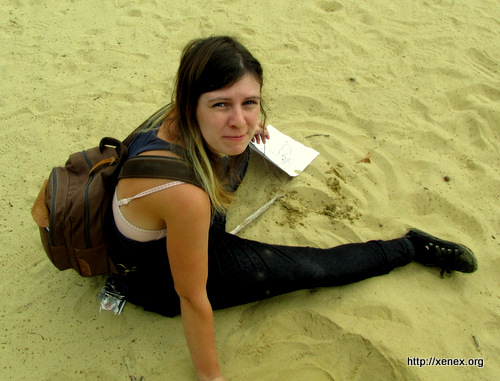
After a buffet lunch and in absence of the threatened rain, Amber suggests that we check out the Desert of Maine. One would not think that Maine, being a somewhat chilly place on the edge of the ocean that - and I can't be clear enough on this point - threatened to rain on us would have a desert, but Amber assures me that the pamphlet in her bag claims it does.
We arrive to a shack with a fake mineral panning operation out front - for the kids and not at all for Amber and me to poke about in search of tiny, shiny rocks. When we enter, a woman with a toothpaste commercial smile and a northern twang gives us the run down as to the desert, ending with a solicitation for money.
"Can we just walk around the desert?" I ask.
She intentionally misunderstands the subtext of my question and say we can absolutely skip her tour and wander, but she still needs us to give her admission. I turn to Amber, playing with a stuffed camel, who shrugs and says something vague that amounts to "okay, sure." Given that she drove us to the edge of the desert, I hand over my debit card.
When the guide leaves us alone, Amber says that she didn't want to pay to wander in the desert but felt awkward saying so in from of this stranger with her palm out.
"We need to come up with a signal for you so we don't waste our time and money," I say.
"I thought I was pretty clear," Amber replies.
"Shrugging is not clear," I fume. "'No thanks' is clear."
The guide comes out fifteen minutes later and directs us onto a cart behind her jeep, along with an older couple who pays no attention to us.
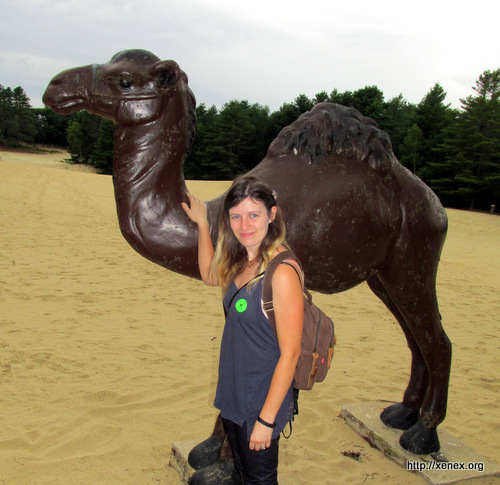
The desert is a mistake, the guide tells us. One man overfarmed it, growing potatoes again and again without giving the soil time to rest in between. His son, the inheritor, followed suit, never rotating his crops because that was not an idea he understood.
Soon, the soil turned to patches of sand, which they wisely tried to remedy by hiding them under cut branches. The sand spread, turning arable soil arid. "The sand is not gritty, like most sand you are used to. It is almost a powder," the guide says. The surrounding town was frightened it would engulf everything. The implication was that the townspeople were on the border of human sacrifice if it might keep their soil useful.
The desertification stopped at the edges of the woods, a basin of poor glacial silt. Hundreds of square acres became useless to farmers, but it wasn't a catastrophe to the wider world. The surrounding forest has, with appropriately glacial pace, reclaimed the edges of the desert. An expert pronounced that, in another four hundred years, the Desert of Maine will be no more.
Subsequent owners have tried to make the sand useful. One bought it, intent to make bricks, but the fineness of the sand meant they collapsed to a pile almost immediately. Then he tried to make a glass, but only ended up with black slag. The guide says, "What he didn't realize is that it was excellent high temperature glass, like the kind used on the front of stoves. He just didn't know how to do it."
After that, the desert became a version of the tourist trap it remains to this day. It had camels for a while, now memorialized by their plaster equivalents, but one of them had a tendency to chase tourists to try to step or spit on them. It briefly had donkeys people could ride, but it was decreed that they required an on staff veterinarian, who was so draconian as to say the donkey deserved breaks.
A spring was discovered on the grounds that poured forth potable water and a became one of the focal points of the experience. However, the fine sand would almost daily cover the house. Eventually, the owner gave up trying to dig it free again. Our cart drives over the sand that has buried the spring house above its roof.
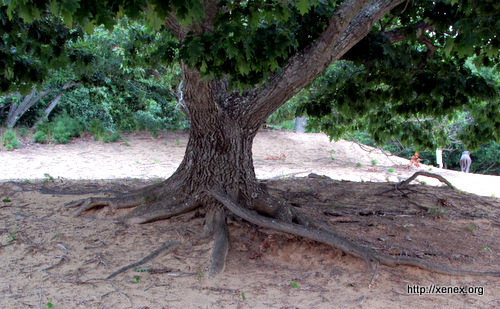
Some trees here have developed an adaptation I have never heard of before. When the sand covers their branches, these slowly convert into roots so that the tree can continue to survive as it is covered. They do not return to being branches when uncovered, leaving the trees seem mutated and naked when the wind reveals hidden boughs.
The next day, we pack up and make our way to Port Clyde. I had assumed that Portland was a distraction and this was the main event - no pun intended - but Amber assures me that the excitement is behind us.
We check into the Seaside Inn. Indeed, the sea is across the street, though it seems to be a murkier and more utilitarian sea; this is not water meant to sparkle in the eyes of tourists but the sort callous-fingered fishers have plumbed for countless generations.
Coming to this corner of Maine, it is impossible not to notice the palpable slowness. There is no way we could have only done this and considered it a vacation. A coma, maybe. We move through the world as though slogging through molasses. Even our GPS affects a laconic drawl when pronouncing some of the street names, though the more reasonably minded might chalk this up to a programming error.
After we drop our luggage - our room, termed the Crow's Nest, is up three flights of narrow stairs and down an unlit hallway - we set out for some food. Portland spoiled me, in that I could not walk a few minutes without coming upon a half dozen opportunities to eat. Granted, they weren't necessarily appetizing, but their ubiquity was reassuring to someone from the Hudson Valley.
"I'm giving this ten more minutes," I tell Amber, "then we are turning back and eating snacks for dinner."
"Real minutes or Maine minutes?"
I shake my head. "We will be old and gray before ten Maine minutes go by. Mainers invented tantric sex when they had a quickie."
Portland could have been any city in the world, our hotel any rundown hotel. Port Clyde is too uncluttered to be anything but what it is. There is a reason Stephen King set his stories in little Maine towns. It is too quiet to be believed wholly savory.
We end up following a chalk sign to a place called The Harpoon, one with a boat out front with a winking mermaid on its prow. Their evident pride was that Tom Hanks stopped to eat here when filming a scene in Forrest Gump, a boast I will hear echoed throughout this town. I am not sure anything so noteworthy has happened before or since.
The Harpoon is a dim eatery evidently popular to the locals as one of the only places that will serve them. Echoing, live versions of popular music from an iTunes playlist complement the ambience. I indulge a quick fascination with our curvy waitress, Amelia, her nose cutely upturned. I want to sit her down at the bar and interrogate her as to her dreams. Does she want to get out of this town or did she fight, cheat, and steal to get to be somewhere so quiet and unassuming? How does someone like her end up waiting tables in this coastal Maine town unless it bore her some twenty-odd years ago? I want to write her story down before she has the chance to live it all but I fear she is intent to keep it to herself from anyone who cannot charm it out of her between bedsheets or starry nights.
The trip feels to have gone long. Amber says this is simply Maine time. Everything goes long here.
The king bed in the inn was so large I could get lost. I try to sleep diagonally for the novelty, but soon retreat to my corner to avoid the seam where the two twin beds meet. This feels more like an empty house than a bed and breakfast, lacking a wholesomeness I associate with the concept. Perhaps it is that the innkeepers outsource breakfast-making to the inn up the road. We have laminate vouchers that grant us a full breakfast, whatever that may end up being. It's curious to feel homesick on so short a trip, not when I am adventuring with Amber, but I have a routine at home. I have more wholesome foods; I think I will be queasy for a time in the presence of French fries.
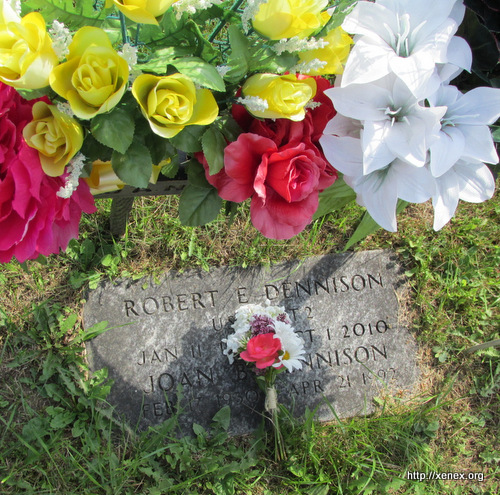
Amber snips flowers from the garden in front of our bed and breakfast the next morning to deliver to her grandfather. She considered buying some, but that would imply the infrastructure in this area that could support a florist or, at the very least, a competent grocery store. The dead, in my experience, do not mind purloined roses and it is hard to imagine the flowers will be missed. At the prices the inn charges, they can afford some pruning.
Amber drives with appropriate slowness down rural streets, awash in hazy memories of summers spent up here when she was smaller. She almost halts before the house that had been her grandfather's, openly offended that its current occupants have disgraced it with an above ground pool. "I had the cutest bedroom there," she says, motioning to a window on the second floor. "It was literally only big enough for a twin bed. It had the ugliest kitten wallpaper. I wish I could show you."
We wander the small graveyard, a peninsula of graves in an ocean of trees, without finding his grave. He has been dead as long as I have known Amber and her memory is not strong. After twenty minutes of looking at every stone we could, Amber calls her mother for guidance, then stays on the phone after dropping the pilfer bouquet on a plaque on the ground. She has no audible words for her departed grandparents, but she waits a moment while gazing downward.
There is something to the air up here that leads one to compulsive napping. Perhaps all these trees excrete dangerous levels of oxygen that can only be processed in sleep. Maybe they have learned that we make better fertilizer for them unconscious.
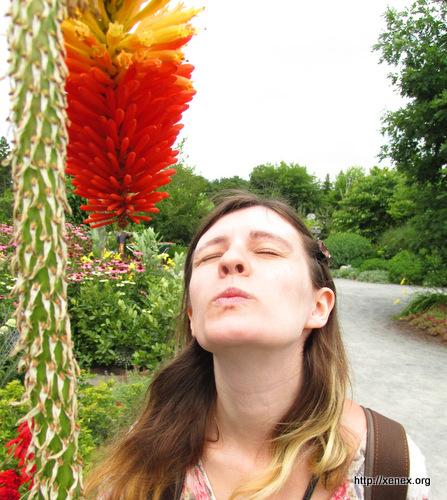
A special demographic invests their money in memberships to botanical gardens, if today is meant to be representative: middle-aged to old white people. No one else thinks looking at flowers they didn't need to grow to be a luxury worth much money. These are the people who keep Amber's employers in business.
Were she not intent to be a veterinarian, Amber could delight in being the one who helps keep all these different species in bloom.
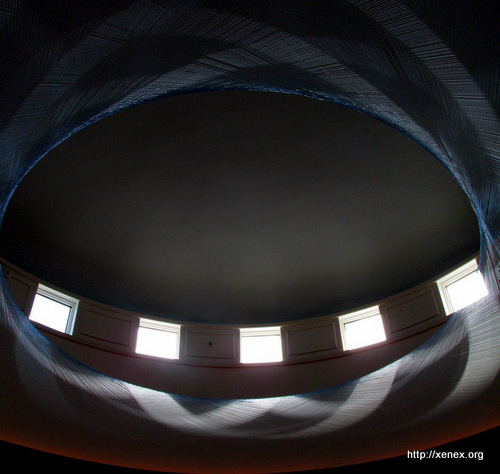
Given Amber's status as an artist, it is as impossible to keep her from art museums as it would have been to dissuade her from a botanical garden.
I often feel as though I cannot fully connect with art, irritated at its pretense. I do not understand it, so I suspect that no one else does either. It's solipsism at its core, but much of art reminds me of when a girlfriend in college took me to an improvisational jazz show that amounted to five people atonally and badly playing instruments as though to deafen the other performers on stage. As the audience of fellow college students hummed thoughtfully and as my headache built to the only crescendo that night provided, I grew furious that we were all being duped into pretending anything cultural were occurring.
I have mellowed as I've aged and granted that people might have a context I did not. Some art still seems like nonsense daring the consumer to be philistine enough to point this out, but most of it comes from a place of sincerity. I do not think one can long live with oneself if one does not believe in the art immensely.
As Amber darts between paintings done by one Wyeth or other - the Wyeth clan ruled this corner of Maine with painted fists - I feel the equivalent of a contact high. Museums in my memory had a performative aspect. One needed to be seen appreciating the art in just the right way, peeling off one erudite comment after the other. (In my case, this has tended to be self-deprecating remarks about my misunderstandings.) However, this is rendered inert if one focuses more on the exhibits than the patrons. It's hard to perform when one forgets one might have an audience.
While it is easy to state just why one doesn't like a work of art, the sublime lacks explicability. One can talk about influences, brushwork, styles, but the real beauty of it comes from a place where words cannot reach. This is, in part, while the performance grates on me when I notice it: they are talking too loud for me to focus on what I'm not able to articulate.
With museums, I feel I am at best stealing creative yeasts with which to make my strange pasties later. Maybe this is why we call it culture.
Amber takes me to a restaurant she remembers from her childhood. She wears a bathing suit, pink and black, beneath her shirt because she intends to head to the beach after we eat. This place is too fancy by far, something the waitress makes clear by asking if we have reservations to a mostly vacant dining room. Savoring haddock and scallops - because savoring is all one is allowed to do at these prices - listening to a late middle aged pharmaceutical representative tell two nurses in his acquaintance how kids these days (by which he means freshly-minted doctors) have no value in work, I cannot help adoring my wife. She is so bright-eyed and optimistic. She soothes my neuroses like no pill (and certainly not my bimonthly therapy check-in) ever could. I have never felt so loved.
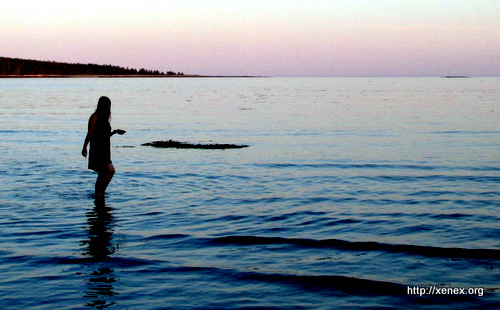
Hardly full, but fed, we head to a beach near our inn. My toe was gashed open scrabbling over barnacle-encrusted rocks earlier, resulting in copious blood but no actual pain, so I leave the ocean to Amber.
The tide is coming in. When it does, this beach with disappear beneath the waves, washing away the sandy inscriptions and footprints left by the families vacating ahead on the tide.
Amber doffs her shorts, leaving them and a towel in a cove between rocky outcroppings dozens of feet from the water, though the ocean gobbles back dry land greedily. She wades in the shallows, letting them deepen around her from calf to thigh.
Amber scoops up a tiny and merely small hermit crab from the water to show me. The small one pounces on the tiny one. She flings them apart, yelling after them, "No fighting!" She repeats this with every pugnacious crustacean she happens upon until fifty feet of sunset ocean separates us.
Soon in Xenology: Faces. Travel.
last watched: Deathgasm
reading: The Way of the Peaceful Warrior
listening: Fiona Apple
Spend While You Can ««« 2016 »»»
Thomm Quackenbush is an author and teacher in the Hudson Valley. He has published four novels in his Night's Dream series (We Shadows, Danse Macabre, Artificial Gods, and Flies to Wanton Boys). He has sold jewelry in Victorian England, confused children as a mad scientist, filed away more books than anyone has ever read, and tried to inspire the learning disabled and gifted. He is capable of crossing one eye, raising one eyebrow, and once accidentally groped a ghost. When not writing, he can be found biking, hiking the Adirondacks, grazing on snacks at art openings, and keeping a straight face when listening to people tell him they are in touch with 164 species of interstellar beings. He likes when you comment.